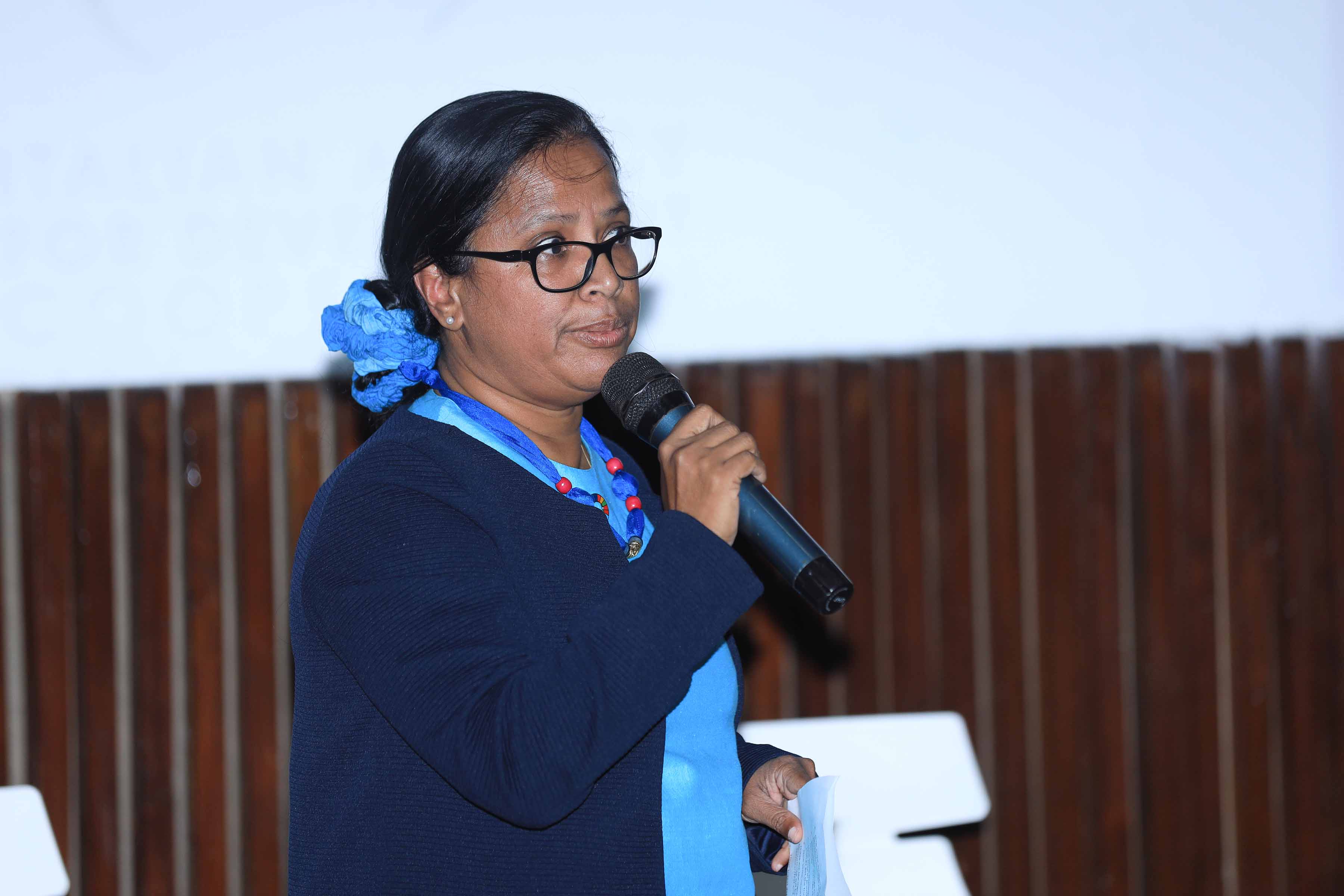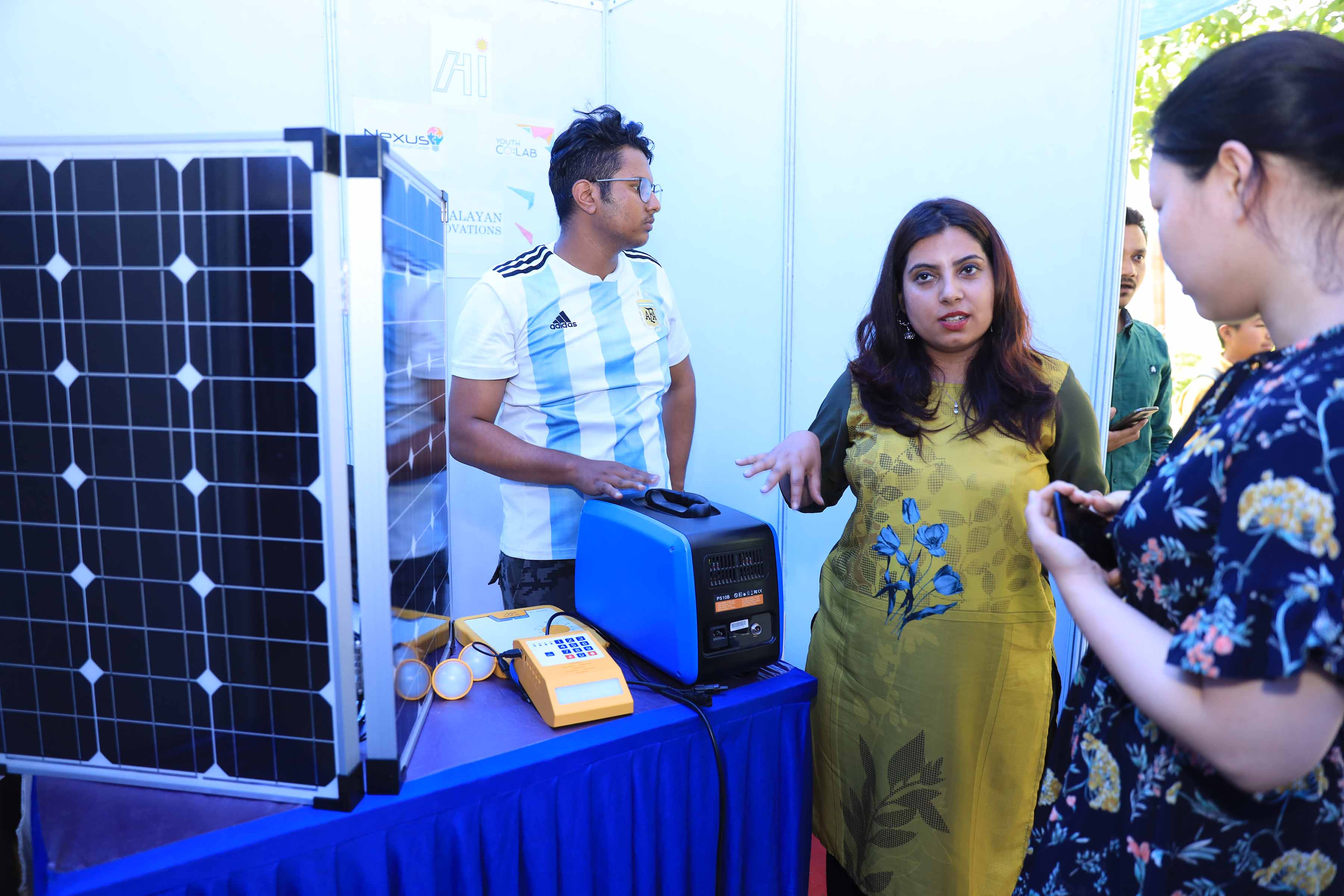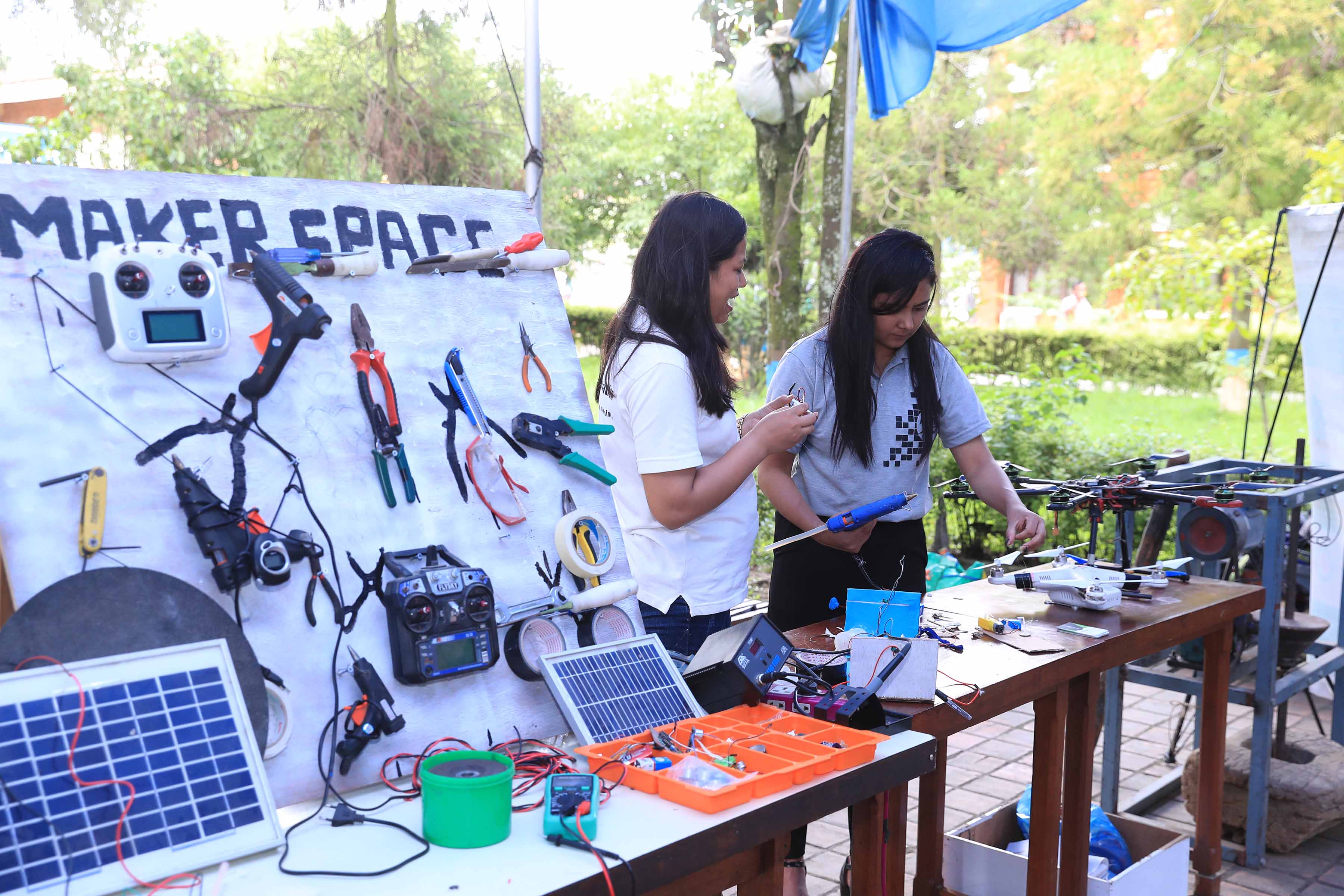Ms. Ayshanie Labe, RR of UNDP Nepal giving the opening remarks.
Kathmandu: The launch of the Accelerator Lab in Nepal on 1 August was all about celebrating the culture of innovation. The launch event was hosted in Staff College with 400+ participants including official state delegates, representatives from the development communities, students and innovators. The atmosphere of the event was about embracing and recognizing the innovation culture in Nepal.
The Nepal lab is part of a network of 60 Accelerator Labs across the world, making it world’s largest and fastest learning network around development challenges. As a knowledge hub for experimentation and scaling of innovative ideas, the lab will help countries accelerate the progress towards the Agenda 2030 and the Sustainable Development Goals (SDGs).
Mr. Giulio Quaggioto, UNDP Regional Lead introducing the Accelerator Lab.
The event was officially inaugurated by the Resident Representative of UNDP Nepal, Ms. Ayshanie Medagangoda-Labé. In her opening remarks, Ms. Labe said, “UNDP is introducing a new approach and the learning network to solving development challenges through the Accelerator Lab. The lab will be a space for us to explore and make sense of the reality and ask the question “how did they do it?” while t mapping the locally sourced solutions: How people, protected themselves and survived shocks from disasters despite being poor, how disable men or women or senior citizens got a pension on time and how some youth enjoyed a decent living out of farming. How some communities managed to access clean water, escaped air pollution, managed waste in the absence of organized public services. How some municipalities managed to simplify procedures, fast deliver building or business permits and got trust of their citizens…Building on the mapping, the Lab shall scale up the development solutions for “Human development.’’
Mr. Giulio Quaggioto, UNDP Regional Innovation Lead explaining about the lab
From left: Mr. Guilio Quoggito, Ms. Claudia Hiepe, H.E. Mashefee Binte Shams, Mr. Kulman Ghising, Mr. Mahabir Pun and Ms. Mira Rai.
The event kicked started with a panel of change makers from our community who shared their story of innovation with the audience. The panel segment was moderated by Mr. Giulio Quaggioto, UNDP Regional Innovation Lead. Mr. Quaggioto said, “If we want to achieve the SGDs we have to work differently as we don’t have enough time left to achieve the goals by 2030. As for how the lab will operate, if we have challenges such as urbanization or youth employment, we will explore ideas that already exist and people who are working on it. First, we will try to engage with those experts and second, if we don’t have existing solutions, we will create a portfolio of experiments and test them in necessary areas to ensure that solution aligns with the problem in a real-time basis.”
Ms. Claudia Hiepe, Deputy Chief of Mission,Head of Germany Development Cooperation, Embassy of the Federal Republic of Germany
The main highlight of the launch was the panel discussion which comprised of change makers like Ms. Mira Rai, Mr. Kulman Ghising, Mr. Mahabir Pun, H.E. Mashfee Binte Shams and Ms. Claudia Hiepe. Each of these distinguished panel members had one common element in their speech which was about leading the change efforts they wanted to see in the community. Here are some key points from their speech:
Ms. Hiepe said she is pleased to support the Lab as it focuses on generating impact. “The German government has been supporting Accelerator Labs all around the world since past couple of years. One such initiative we have been supporting is called the Lab of Tomorrow, it has been operating since 2015 and it has over 7 labs operating under it with more than 300 participants and most of them are from the private sector. I strongly believe that turning development opportunities into business cases will bring more stakeholders into the mix which will help expedite the process of achieving the SDGs.
Mr. Kulman Ghising, Managing Director of Nepal Electricity Authority (NEA)
Mr.Ghising, shared his story about harnessing existing and underutilized skills within the NEA to end the problem of loadshedding in the country .“When I joined NEA, Nepal had been suffering from the problem of 18 hrs of loadshedding a day since past 15 years. I encountered challenges such as lack of coordination among departments, regulatory issues, trade union issues, financial losses and more. Amidst these challenges, I was certain that we would find solutions and call it innovation or good management practice, but we achieved our target of turning a NPR 9 billion loss making institution to a NPR 2 billion profit making institution by gradually eliminating the loadshedding hours. And since couple of years we are operating at a profit nearing 10% annually.“
H.E. Mashefee Binte Shams, Ambassador of Bangladesh to Nepal
Ambassador Shams shared Bangladesh’s experience on leveraging innovation for poverty reduction, agricultural growth and overall improvement of the economy, thereby graduating from the Least Developed Country (LDC) status to a medium-income country. “When Bangladesh got its independence in 1971, we had virtually nothing not even infrastructures. But today we have become a self-sufficient nation in terms of food production and are able to feed our 170 million citizens. Nepal and Bangladesh have a shared vision of future prosperity and development. And we hope we continue this relationship as we step into the future.”
Mr. Mahabir Pun, Founder of National Innovation Center
Mr. Pun shed light on the importance of innovation. He added that Nepal will become a developed nation only when the government and individuals work together to support and elevate innovative ideas. “I have supported the SDGs by bringing free internet in villages to better the education quality. I have also been able to bring better health services by building health posts in remote areas. I have also helped people to get employment through tourism by starting eco-tourism in remote areas. In past 27 years, I have worked in 150 villages as a social worker.’’ He also talked about his initiative- Nepal Innovation Center which has been nurturing innovative people to become entrepreneurs by supporting them in commercializing their ideas.
Ms. Mira Rai, Trail runner and National Geographic adventurer of 2017
Ms Rai shared her story from becoming a school girl from a small village in Nepal to becoming a national ambassador for sports. “I used to engage myself in small income generating activities to support my family. I was training to become an army during my late teens, where I went through intense physical trainings, however, I failed the endurance test and couldn’t become the member of the army. During this dark time of my life I received support from UNDP to continue my education and participation in sporting activities.’’ She later participated and won the Himalayan Outdoor Festival 50k running competition. Gradually she was recognized as a serious athlete and received various opportunities to represent Nepal in international trail running competitions.
UNICEF's Representative Elke Wisch
Addressing the programme, UNICEF Country Representative Elke Wisch said, ‘’At UNICEF, we have been continuously seeking new and better solutions that address the challenges for children around the world. One of our main lesson is that, we innovate best when we innovate with and through children and young people. We are happy to be working with UNDP here in Nepal as part of the Accelerator Lab platform and moving this joint youth agenda forward.”
Addressing the event, UN Resident Coordinator, Ms. Valerie Julliand emphasized on the need for accelerating our pace of development to meet the 2030 SDG targets and said the Lab could help expedite the process.
Apart from the panel discussion, the launch event hosted a series of activities to showcase the existing innovation culture in Nepal. A Robo-Football match showed how technology can be fun for all ages.
Cartoonist in action as the slam poetry is being delivered.
The two frontier challenges which will be the focus of the Accelerator Lab in Nepal i.e. unemployment and unplanning urbanization was introduced through slam poetry and depicted by the skill of a live-sketch cartoonist.
A friendly football match between UN agencies inculcated the sense of teamwork and collaboration among the UN to support the Accelerator Lab.
A friendly football match between UN agencies inculcated the sense of teamwork and collaboration among the UN to support the Accelerator Lab.
Holding true to the theme of the event, innovators also showcased and share their ideas with hundreds of guests. From growing vegetables and herbs in water to designing a bracelet to help women track their menstruation cycle, each of these ten ideas are brining a positive change in our society.
UNDP, currently engaged in over 170 countries and territories across the world, is mandated to support Member States in their efforts to advance the Agenda 2030 and the SDGs by providing integrated solutions to the development challenges they are confronting. The Accelerator Lab, funded by the State of Qatar and the Federal Republic of Germany, will work together with national and global partners to find radically new approaches that fit the complexity of current development challenges.
With this, the lab will identify more of such change makers in our community and help them accelerate their ideas to reinforce change from the ground-up.
Press Release:
http://www.np.undp.org/content/nepal/en/home/presscenter/pressreleases/2019/accelerator-lab-launch-in-nepal.html
Photo link
https://bit.ly/2Mv7Q4J
 |
 |
 |
 |
 |

 Locations
Locations




















